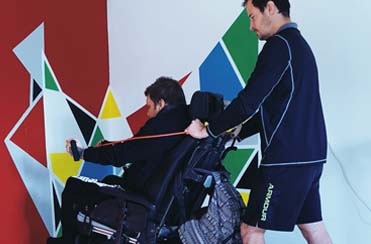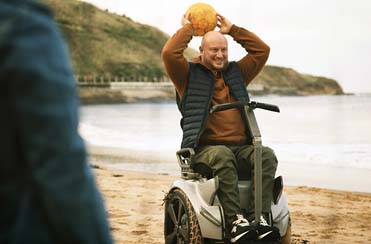Staying active is essential to maintain mobility and improve your quality of your life. Explore five simple wheelchair exercises that you can do every day.
Following your recovery period from a spinal cord injury, you’ve spent months getting into a routine. But are wheelchair exercises part of your day? Many people in wheelchairs experience weight gain due to a lack of activity and exercise, resulting in an increased risk of many secondary medical issues. You can avoid these risks and improve your mental and emotional health with a daily wheelchair exercise routine. Best of all, there are many simple and quick wheelchair exercises you can do at home. Please note – some of these might require help from your carer or a family member. Consult your medical team and physiotherapists before embarking on a new exercise programme.
Simple upper body wheelchair exercises
The focus of these wheelchair exercises is the upper body area: core, chest and shoulders. Focusing on upper body wheelchair exercises is vital to maintain strength, flexibility and stamina, so you can easily get around, complete safe transfers and perform other daily tasks.
Manual wheelchair “roll”: If you have a manual wheelchair, you’ll be getting some exercise automatically. However, it’s better to set up a daily time where you roll around the neighbourhood and propel yourself with a manual wheelchair, especially if you normally use a powered model. Start with shorter distances or time intervals and work your way up gradually.
Deep breathing: Your abdominal muscles play a vital role in healthy respiration. Close your eyes and start by focusing on taking slow, deep breaths, becoming consciously aware of the air flowing in and out of your body for five to ten minutes. This will help strengthen the core and increase oxygen intake to optimise body functions, as well as improve your mood. This exercise does not have to be done in your wheelchair.
Core: It is critical for those with a spinal cord injury to maintain core strength. There are several core wheelchair exercises you can do, but a good starting point is the seated side crunch:
· Whilst seated in your wheelchair, tilt your upper body to one side, making sure your lower body doesn’t move at all.
· Hold for 5 seconds, then slowly return to centre.
· Repeat with your other side.
· Start with five repetitions, rest, then do two more sets. Increase as you become stronger.
· You can also rotate in other core exercises for variety: crunches, cross-body leg lifts, trunk extensions, supine twists.
Resistance: Using free weights or resistance bands, you can start with shoulder extensors. If you use a band:
· Attach it to a sturdy object at waist height and grasp one end with your arm straight.
· Pull the band toward the ground until it is behind your chair back.
· Slowly return to your starting position.
· Start with three sets of five repetitions and work your way up.
· Make sure that you rotate in other resistance exercises so that you cover all the important muscle groups.
Stretching: Maintain flexibility by integrating stretching into your daily routine. One straightforward upper body wheelchair exercise you can do anywhere and at any time is a posterior capsule stretch:
· Hold one arm across your body, using your other hand to gently pull it across your chest until you feel a good stretch and hold for 20-30 seconds.
· Repeat with the other arm.
· Do three sets of five repetitions.
· Rotate other stretching exercises into your daily routine.
Add variety to your daily wheelchair exercises
These are a few examples of simple wheelchair exercises you can start to do every day. However, it’s important to rotate in new activities every day, as noted with core, strengthening and stretching exercises. Rotating in new wheelchair exercises ensures you hit all the key muscle groups to keep you strong and mobile.
References:
- Stay at Home Wheelchair Workouts - New Mobility
- Sports for Individuals with Spinal Cord Injury - Physiopedia (physio-pedia.com)
- The importance of exercise - Reeve Foundation (christopherreeve.org)
- What Does Independence Mean to Me? Aspire
- Protecting Your Shoulders and Staying Healthy After Spinal Cord Injury (washington.edu)
- Yoga for Paralysis (yogaanytime.com









